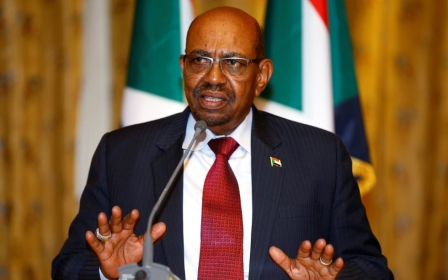Sudan's military arrests two of Bashir's brothers

Sudan's army-led transitional council announced on Wednesday that they have arrested two of ousted president Omar al-Bashir's five brothers as part of a continuing campaign of arrests against "symbols of previous regime".
Earlier on Wednesday, Bashir was moved to Khartoum's grim high-security Kobar prison from the presidential residence, family sources said, as military rulers announced steps to crack down on corruption.
Over three decades of Bashir's rule, tens of thousands of activists were detained, beaten, tortured and killed in Kobar by National Congress Party officials and its security system.
The Transitional Military Council (TMC) said the Bashir brothers, identified as businessmen Abdallah and al-Abbas, were the most prominent among several people who had been detained.
TMC spokesman Shams El Din Kabbashi also said in a statement on state TV that irregular forces operating outside state institutions under Bashir - including the Popular Defence Forces, the National Service and the Popular Police - had been brought under direct military or police control.
The forces had been accused by protesters of being linked to Bashir's ruling National Congress Party.
Lieutenant Genera Abdel Fattah al-Burhan, who has engaged in impromptu dialogue with protesters in the streets of the capital, now heads the TMC and has promised to hold elections within two years.
On Wednesday, representatives of the Sudanese protest movement and main opposition groups, known as the Forces of the Declaration of Freedom and Change, submitted a two-page document to the TMC objecting to its rule.
The document called for the establishment of a civilian-led ruling council with military representation, a member of the team told the Reuters news agency.
The document, which was seen by Reuters, also calls for setting up a government comprising no more than 17 ministers and a transitional parliament consisting of 120 members to supervise the work of the government.
The TMC had said it was ready to meet some of the protesters demands, including fighting corruption, but indicated it would not hand over power to them.
Uganda considering offering Bashir asylum
Bashir, 75, had been detained under heavy guard in the presidential residence inside the compound that also houses the defence ministry, before being transferred to Kobar prison late on Tuesday, the family sources said.
Bashir faces International Criminal Court (ICC) arrest warrants over accusations of genocide and crimes against humanity in Sudan's Darfur region during an insurgency that began in 2003 and led to the death of hundreds of thousands of people.
A number of military figures involved in the TMC, including Burhan, have also been accused of war crimes.
London-based Amnesty International called on Wednesday for Bashir to be immediately extradited to ICC custody.
"His case must not be hurriedly tried in Sudan's notoriously dysfunctional legal system. Justice must be served," said Joan Nyanyuki, Amnesty director for East Africa, the Horn and Great Lakes.
Uganda said it would consider offering asylum to Bashir despite the decade-old ICC indictment, Okello Oryem, state minister for foreign affairs, told Reuters.
But Oryem said Bashir had yet to make any contact with Kampala.
Ugandan President Yoweri Museveni has in the past criticised the ICC, calling it a tool of Western justice against Africans. Museveni, who has been Uganda's president since 1986, is a longstanding ally of Bashir's.
Omar Zain al-Abideen, the head of the TMC's political committee, had said on Friday that the council would not extradite Bashir for trial, suggesting he could be tried in Sudan instead.
In The Hague, an ICC spokesman declined comment "on hypothetical situations".
ICC member states, which include Uganda, are legally obliged to hand over indictees who enter their territory.
Bashir has defied the ICC by visiting several ICC member states since the indictment.
Diplomatic rows broke out when he went to South Africa in 2015 and Jordan in 2017, with both declining to arrest him for extradition to the ICC in the Netherlands.
Disclosure of financial holdings
On Wednesday, the TMC announced initial moves to tackle fraud in the country, including ordering the central bank to review financial transfers since 1 April and to seize "suspect" funds, state news agency SUNA said.
SUNA said that the TMC also ordered the "suspension of the transfer of ownership of any shares until further notice and for any large or suspect transfers of shares or companies to be reported" to state authorities.
The TMC also decreed that all state entities disclose financial holdings within 72 hours, and warned that officials who failed to comply could be fined and face up to 10 years in prison, SUNA reported.
The decree applies to bank accounts and holdings of foreign currency as well as precious metals and jewellery inside and outside Sudan.
Meanwhile, the Sudan People's Liberation Movement-North (SPLM-N), a rebel group fighting in the southern Blue Nile and South Kordofan states, announced on Wednesday it was ceasing all hostilities until 31 July as a "goodwill gesture" following Bashir's overthrow.
Middle East Eye delivers independent and unrivalled coverage and analysis of the Middle East, North Africa and beyond. To learn more about republishing this content and the associated fees, please fill out this form. More about MEE can be found here.






